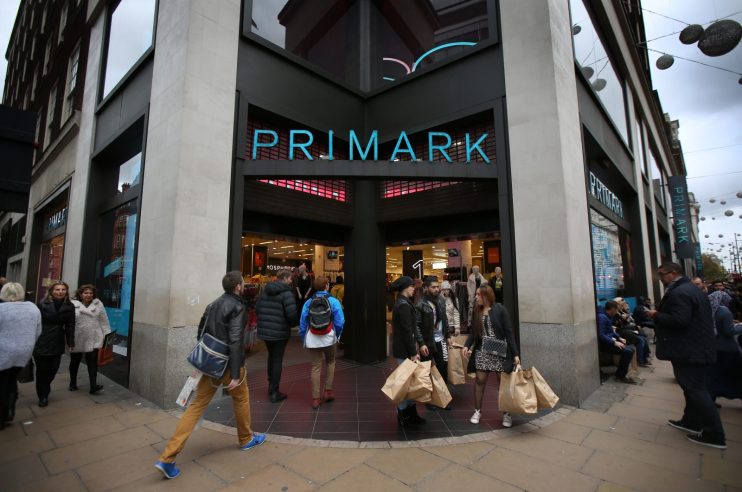ABF pins ‘lower than expected sales’ at Primark on summer pingdemic

Sales at Primark, a subsidiary of Associated British Foods, have dipped below expectations in the last year, as Gen Z shoppers move away from fast fashion brands.
In its pre-close trading update for the full year to 18 September, Associated British Foods (ABF) said: “We have seen a significant improvement in trading as the period progressed, from a weekly decline in like-for-like sales of 24 per cent at the start of the period to a decline of 10 per cent in recent weeks.”
ABF added that for the fourth quarter, like-for-like sales are expected to be 17 per cent lower than levels seen before the pandemic.
Shares were down 2.31 per cent at a total share price of 1,924.50 by early afternoon.
The food and retail group put the UK sales dip down to the ”rapid and significant increase” in the number of people needing to self-isolate following Covid-19 contact tracing alerts between June and July – amid the so-called the “pingdemic”.
Reduced footfall also curbed sales, as the consumers were cautious about returning to their beloved brick and mortar retailers, ABF said in its trading update this morning.
However, the “lower than expected sales” also comes at a time when Gen Z shoppers are ditching fast fashion brands for more sustainable options.
The group reaffirmed today its intention to focus on Primark’s sustainability strategy, in a bid to reduce its impact on the environment.
The strategy is also intended to “improve the lives of people in its supply chain” as its traditionally low prices have previously sparked concerns over its worker’s pay.
Digital presence
Head of Markets at interactive investor, Richard Hunter, said: “The ‘pingdemic’ came at a bad time for Primark, throttling some of the recovery it had been seeing and holding back sales in the fourth quarter.”
“When access to the stores was unfettered, the picture was extremely bright. A combination of pent-up demand and very high basket sizes propelled sales and, since the easing of further restrictions, sales of the likes of the back to school ranges started strongly.”
But amid a new era of online shopping, Primark’s digital presence is lagging behind its competitors.
Hunter explained: “One of the key limitations around Primark has been the lack of an online presence, which the group is now looking at least to partially rectify.
“The initial design and development of a new digital platform is underway, with expectations that this can be rolled out next year.”
The group has set itself up with a “war chest” to tackle future trading issues, he added, which are likely to arise as the UK emerges from the pandemic and acclimatises to Brexit.
ABF’s cash management has granted Primark a net cash position of £1.9bn, up from £1.5bn at the end of the third quarter and from the £1.6bn total it secured last year.
With the collision of the pandemic and Brexit, there are an array of external factors that can trip up trading levels, Freetrade’s analyst Gemma Boothroyd said.
“The chain blamed the UK’s pingdemic for lacklustre sales in the quarter which will end mid-September,” she said. “And with the Office for National Statistics (ONS) reporting overall retail down 2.5 per cent for reasons varying from the 2020 Euros tournament to bad weather, there are plenty of excuses to point a finger at.”
Senior investment and markets analyst at Hargreaves Lansdown, Susannah Streeter, said: “For now Primark is still firing on all cylinders and its robust operating model meant even the pingdemic, which dented summer sales, didn’t prove the bump in the road to veer off course.
“Although fourth quarter sales were disappointing, full year adjusted operating profits are now forecast to come in even higher than expectation, as lower staff and stores operating costs have meant profit margins have increased.”
Food and agriculture divisions
As for the group’s food divisions, which include AB Sugar, AB World Foods, Silver Spoon and Westmill – ABF reported lifted sales in each.
AB Sugar had a strong fourth quarter, according to the group, while revenue for the full year is expected to be seven per cent ahead of last years.
Although UK sugar production was slashed this year, from 1.19m tonnes to just 0.9m tonnes due to “adverse weather conditions at the time of planting and the severe impact of virus yellows on sugar beet”, its UK sales remained resilient.
Revenues in the group’s UK compound feed business were also “well ahead”, as ABF reaped the rewards of a pandemic-induced commodity price surge and energy costs through feed prices.
Streeter added: “As Primark powers on, swathes of ABF’s food business has proved equally resilient with Sugar expected to also deliver a greater improvement in adjusted operating profit.
“The trend for lockdown baking seems to have endured with the ingredients division seeing an acceleration of demand.”